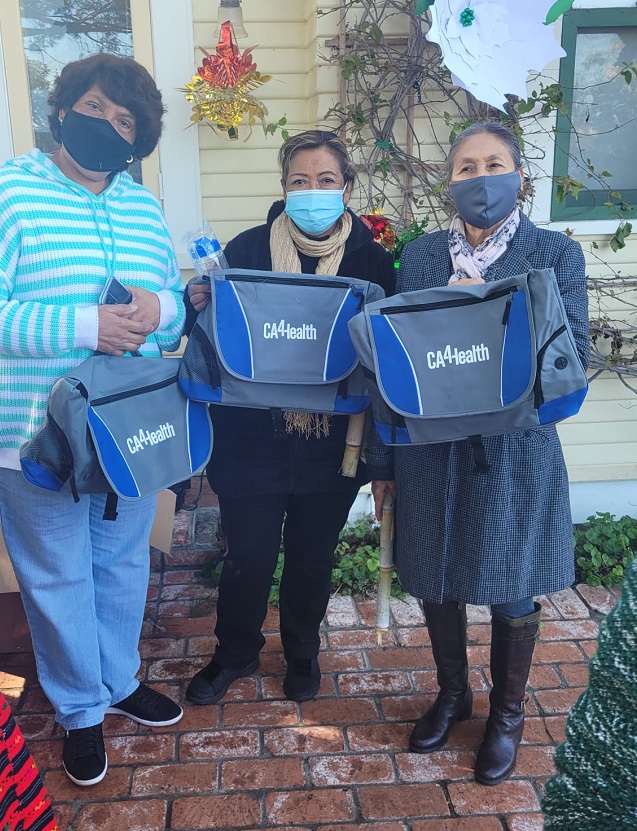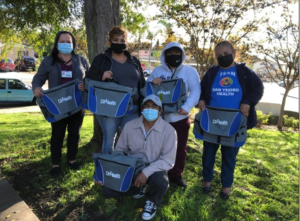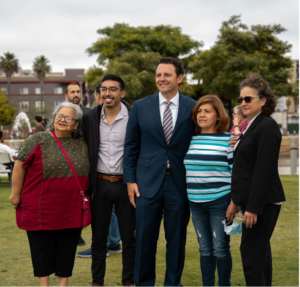Grassroots Leaders Advocate for Local Soda Tax Revenue to Improve Community Health
Program
Highlights

In 2021, PHI's CA4Health worked with a group of grassroots community leaders in San Diego County, known as Resident Action and Advocacy for Health (REAH), to advocate for the removal of a current ban on local soda tax measures.
#1 single source of added sugar in American diets comes from "sugary drinks" and more than half (about 60%) of children and nearly half of adults consume them every day
100+ community leaders participated in a leadership training program to help advocate for the removal of a soda tax ban.
PHI’s CA4Health is an inclusive statewide community of practice comprised of diverse and committed stakeholders advancing chronic disease prevention and equity across California. In 2021, CA4Health partnered with the San Diego County Childhood Obesity Initiative to help a cadre of community leaders build leadership and civic engagement skills to advocate for needed policy changes. REAH grew out of those efforts and community leaders had their hearts and minds set on advocating to remove the soda tax ban to be able to address health inequities, such as the overabundance of unhealthy food and beverages in their communities and raise local revenues for important health programs.
- More than 1 in 3 children in San Diego County will develop childhood obesity.
- Diabetes death rates in San Diego County are highest among Native Americans, which are nearly three times higher than the average rate, followed by African Americans.
- 995,121 residents in San Diego County live in food deserts, where healthy foods are not easily accessible.
- In 2017-2018, over one-third (34%) of all 5th, 7th and 9th grade students in the county were overweight or obese.
For San Diego County residents, a tax on sugary drinks could allow the county to raise local revenues needed to invest in health programs, such as access to healthier school meals and physical activity programs. These investments in programs help to address health and economic inequities, reduce the rates of costly and preventable chronic diseases, and increase awareness about the harmful effects of sugary beverages and foods on our health.
Elevating Community Voices
Beginning in March 2021, over 100 community leaders participated in a 4-week long leadership training program to help them advocate to remove the statewide ban in order to utilize local soda tax revenue dollars for community health improvements. In recognition of their critical perspectives, expertise and leadership, residents were compensated for their participation.

Following the training, community leaders met with 12 different city, county and state elected officials to try to garner their support. Resident advocates shared family and personal experiences, talked about the overabundance of unhealthy food and beverages, and expressed ideas about ways generated revenues from local sugary drink taxes can be used to address community health priorities. CA4Health also led and supported individuals engaging with the media.

Sugar sweetened beverages are one of the major contributors to preventable diet-related diseases. Supporting AB 1163 would give local jurisdictions another tool to help prevent and combat these diseases.Fadra Whyte, DMD, MPH
Pediatric Dentist
We got together to support because we believe that sugary drinks greatly impact our community and we have to offset the burden of diet-related diseases and hold corporations accountableDelfina
Comité Organizador Latino de City Heights (COLCH)
The community is really impacted by sugary drinks, and we need the money to be handled by community organizations across the different districts because these are the organizations that work with us to address access to information and health services.Delia Contreras
Voluntaria Independiente de la Comunidad De City Heights and Voluntaria de Hoover High School
We are fighting against a monster (big soda) and we are not afraid.Ana Solano
Comité Organizador Latino de City Heights (COLCH)
We have disproportionate impacts in our communities living in poverty. Soda is cheaper than water and we need to turn that around.Florenica
Comité Organizador Latino de City Heights (COLCH)
Chronic diseases such as diabetes and cholesterol run in my family, so I try to avoid drinking drinks like soda and sugary juices because I’m at a high risk for them.Aisha Mahamud,
Youth Advisory Council
This initiative will help us bring funding for health prevention programs, educational programs, and other community needs.Guadalupe Estrada
Kitchenista, Community Advocate and National City resident.
This pandemic has exacerbated existing inequities in health care. As a family medicine physician, I have diagnosed many of my pediatric patients this past year with obesity and high cholesterol. The lack of activity and lack of healthy choices for meals worsened during this pandemic. I recently saw two brothers who had become obese and now both had high cholesterol. The mother reported that because of the pandemic they had been mostly playing video games as sports had been cancelled. Due to family stressors, they also were eating out a lot more. The opportunity to have additional funding through a sugar sweetened beverage tax to create programs to address the root causes of these inequities would greatly improve the health of the children in the communities I serve in the South Bay.Melissa Campos, MD,
Family Medicine, Champion Provider Fellow
Youth and adult community leaders joined with other advocates, such as Californians for Less Soda and continued to share their lived experiences in the media and through a community engagement platform, Soapboxx. On the platform they created videos in English and Spanish to express how their community could benefit from a local soda tax measure and their own visions for a healthy, thriving community. See selected videos below and find the full series on Soapboxx:
While REAH’s advocacy efforts were a catalyst for critical conversations with policymakers and other key stakeholders and while all of the elected officials supported the idea of investing sugary drink tax revenues back into communities impacted the most by COVID, racism, disparities and systems of oppression, more mobilizing needs to take place to help advance the group’s goals and build political will.
Additional resources:
CA4Health One-Pager / Community Benefits of Taxing Sugary-Sweetened Beverages
The San Diego Union Tribune / Opinion: Taxing Soda and Other Sugary Drinks Can Boost Community Health. California Should Allow It.
ABC 10 News – San Diego / Calls for ‘Soda Tax’ on Sugary Drinks Grow After Year Lacking in Physical Activity
Work With Us
You change the world. We do the rest. Explore fiscal sponsorship at PHI.
Support Us
Together, we can accelerate our response to public health’s most critical issues.
Find Employment
Begin your career at the Public Health Institute.
